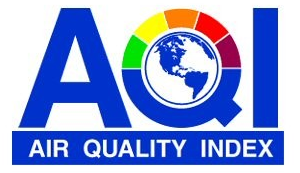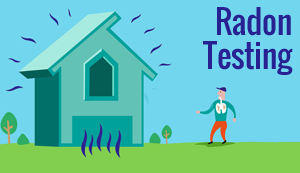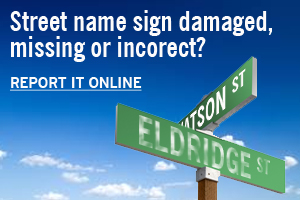Exposure to radon gas is the second leading cause of lung cancer in the United States. You should test your home for radon. If high radon is found, the radon level can be reduced - making your home more safe.
- Why Should You be Concerned about Radon?
- What is Radon?
- How Does Radon Enter Your Home?
- Should You Test for Radon?
- How Do You Test Your Home for Radon?
- What Should You Do if Your Test Results Show High Levels of Radon?
- How Can You Learn More about Radon?
Why Should You be Concerned about Radon?
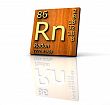 Radon exposure increases the risk of lung cancer. The U.S. EPA estimates that radon
causes over 21,000 lung cancer deaths per year in the United States. The U.S. Surgeon
General has stated that indoor radon is the second leading cause of lung cancer
in the United States.
Radon exposure increases the risk of lung cancer. The U.S. EPA estimates that radon
causes over 21,000 lung cancer deaths per year in the United States. The U.S. Surgeon
General has stated that indoor radon is the second leading cause of lung cancer
in the United States.
Your chance of getting lung cancer from household radon depends on how much radon is in your home and on the amount of time you spend in the home. Radon gas decays into radioactive particles that can get trapped in your lungs when you breathe. As the particles further break down, they release small bursts of energy that can damage lung tissue. Over the course of your lifetime, this damage can lead to lung cancer.
What is Radon?
 Radon is a colorless, odorless gas that occurs naturally and is found in most soils
at varying levels. Radon is constantly produced from the breakdown of uranium in
soil or rock. Radon gas is even present outdoors in very small amounts, but can
become significantly concentrated inside buildings. Any type of home can have a
radon problem: new homes, old homes, drafty homes, and well-sealed homes. Similar
houses located next to one another may have very different indoor radon concentrations.
The only way to know your home’s radon level is to test it.
Radon is a colorless, odorless gas that occurs naturally and is found in most soils
at varying levels. Radon is constantly produced from the breakdown of uranium in
soil or rock. Radon gas is even present outdoors in very small amounts, but can
become significantly concentrated inside buildings. Any type of home can have a
radon problem: new homes, old homes, drafty homes, and well-sealed homes. Similar
houses located next to one another may have very different indoor radon concentrations.
The only way to know your home’s radon level is to test it.
How Does Radon Enter Your Home?
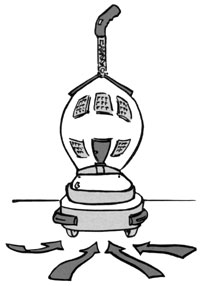 The most significant source of radon in homes is the underlying soil. Radon gas
in the soil can enter homes through dirt crawlspaces, cracks in the basement walls
or floors, floor drains, or sumps. The air pressure inside a house is typically
lower than the pressure in the air and in soil around the building. This difference
in pressure causes the home to exert a slight “vacuum effect” that draws radon gas
into the home. Basements that are considered “waterproof” are not necessarily “radon
proof” because radon gas can penetrate even where water cannot. Because radon enters
the home from the soil, lower levels of the home have greater radon concentrations
than upper levels.
The most significant source of radon in homes is the underlying soil. Radon gas
in the soil can enter homes through dirt crawlspaces, cracks in the basement walls
or floors, floor drains, or sumps. The air pressure inside a house is typically
lower than the pressure in the air and in soil around the building. This difference
in pressure causes the home to exert a slight “vacuum effect” that draws radon gas
into the home. Basements that are considered “waterproof” are not necessarily “radon
proof” because radon gas can penetrate even where water cannot. Because radon enters
the home from the soil, lower levels of the home have greater radon concentrations
than upper levels.
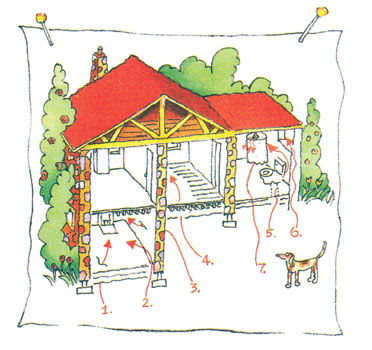 If water is supplied to a home from an underground well, there is a chance that
radon may enter the home in the water supply. Typically the health risk from radon
entering a home through the water is much less than the risk of radon entering the
home through the soil. Homes receiving their water from surface water sources (such
as lakes or rivers) do not usually have problems with radon in the household water.
Most municipal water supplies get their water from surface sources. In Forsyth County
NC, the City/County public water supply draws its water from the Yadkin River and
Salem Lake.
If water is supplied to a home from an underground well, there is a chance that
radon may enter the home in the water supply. Typically the health risk from radon
entering a home through the water is much less than the risk of radon entering the
home through the soil. Homes receiving their water from surface water sources (such
as lakes or rivers) do not usually have problems with radon in the household water.
Most municipal water supplies get their water from surface sources. In Forsyth County
NC, the City/County public water supply draws its water from the Yadkin River and
Salem Lake.
Should You Test for Radon?
All homes should be tested for radon to determine if there is a radon problem. If radon levels are high, the problem is fixable. The U.S. EPA advises that steps be taken to reduce radon levels in the home if the levels are at or above 4 picocuries per liter of air (4 pCi/L). There is, however, no “safe” level of radon. Radon levels below 4 pCi/L still pose some risk.
How Do You Test Your Home for Radon?
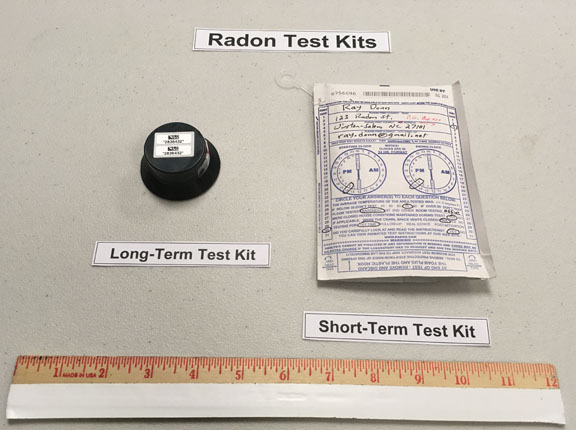 Testing your home for radon is not difficult. You could hire a professional radon
measurement provider to do the testing for you. Alternatively, you could buy a test
kit and do the testing yourself. The Forsyth County Office of Environmental Assistance
and Protection sells radon test kits. We would be happy to sell you a radon test
kit, but you do not need to buy your test kits from us. Test kits may also be purchased
from various retail stores or over the internet. We encourage you to test your home
by whatever means is best for you.
Testing your home for radon is not difficult. You could hire a professional radon
measurement provider to do the testing for you. Alternatively, you could buy a test
kit and do the testing yourself. The Forsyth County Office of Environmental Assistance
and Protection sells radon test kits. We would be happy to sell you a radon test
kit, but you do not need to buy your test kits from us. Test kits may also be purchased
from various retail stores or over the internet. We encourage you to test your home
by whatever means is best for you.
Our Office sells two types of radon test kits: Short-term test kits and long-term test kits. Our short-term kits are charcoal canister kits that can be placed in a home for 3 to 7 days. Our long-term kits are alpha-track kits that should be placed in the home for at least 91 days and up to a full year.
The cost for each type of radon test kit is $9.05 for a short-term kit and $33.00 for a long-term kit, including postage. To order a test kit from us please call our Office at (336) 703-2440 during normal business hours Monday - Friday, 8:00 AM to 5:00 PM. We are closed on weekends and Forsyth County holidays. After you indicate which type(s) of kit(s) you need, an application will be sent to you via email or regular mail with instructions for you to return the completed application to us with a check for payment for the cost of the kit(s) plus postage. The radon test kit(s) will then be mailed to you. We are not able to accept credit or debit cards.
Our radon program is designed for homeowner use in Forsyth County. We do not sell radon test kits to radon testing contractors.
What Should You Do If Your Test Results Show High Levels of Radon?
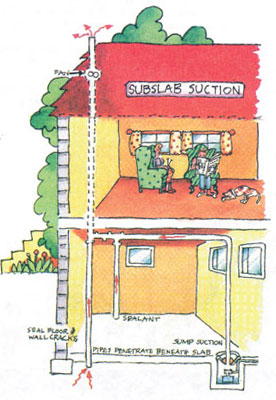 If testing verifies that your home has elevated radon levels, you should investigate
having a radon mitigation system installed. Remember, The U. S. EPA advises that
steps be taken to reduce the radon level in your home if the level is 4 pCi/L or
higher. Professional radon mitigation providers can be hired to install a system
in your home. There are several proven methods to reduce radon levels in homes,
but the one most commonly used is a vent pipe system and fan, which pulls radon
from beneath the house and vents it to the outside. The cost of a home radon mitigation
system depends on your home’s location, size, construction, and level of radon.
Many radon mitigation systems in our area cost in the range of $1,500 to $2,500.
If testing verifies that your home has elevated radon levels, you should investigate
having a radon mitigation system installed. Remember, The U. S. EPA advises that
steps be taken to reduce the radon level in your home if the level is 4 pCi/L or
higher. Professional radon mitigation providers can be hired to install a system
in your home. There are several proven methods to reduce radon levels in homes,
but the one most commonly used is a vent pipe system and fan, which pulls radon
from beneath the house and vents it to the outside. The cost of a home radon mitigation
system depends on your home’s location, size, construction, and level of radon.
Many radon mitigation systems in our area cost in the range of $1,500 to $2,500.
How Can You Learn More about Radon?
Our Office has two radon specialists who are available to answer questions about
radon and to assist you in obtaining the proper type and number of test kits for
your particular home. For more information contact us:
Monitoring and Mobile Sources Division, Radon Program
by telephone: (336) 703-2440
or email us.
The U.S. EPA and the State of North Carolina both have useful radon websites. The EPA radon publications are very informative. The NC Radon Program website has lists of certified radon measurement and mitigation providers.


